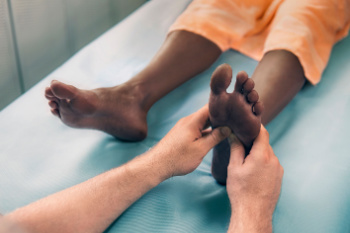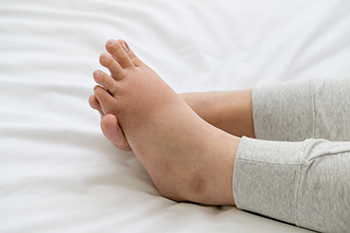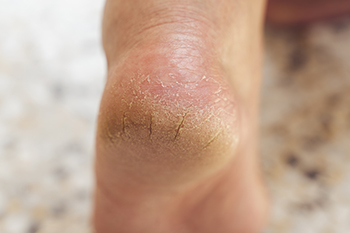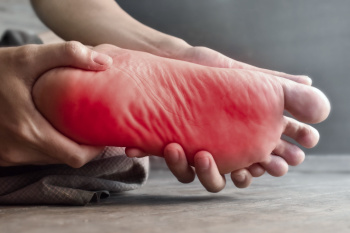Items filtered by date: February 2024
Foot Arthritis News

Foot arthritis is a common condition in older adults, but it has not been studied as much as arthritis in the knees or hands. Most studies focus on the big toe joint, but not much is known about arthritis in the middle of the foot. Approximately 17 percent of people over age 50 have foot arthritis that causes symptoms and is visible on X-rays. The big toe joint is usually affected the most, followed by other joints in the foot. There are several types of foot arthritis, including rheumatoid arthritis, osteoarthritis, and gout that require different treatments. Podiatrists may recommend wearing special shoes, custom-made orthotics, and sometimes surgery to help ease pain. If you have chronic foot pain, you may be suffering from a type of arthritis. It is suggested that you schedule an appointment with a podiatrist for an evaluation and determination of what the cause is, followed by obtaining proper treatment.
Arthritis can be a difficult condition to live with. If you are seeking treatment, contact one of our podiatrists from Foot Care Centers of Palm Beach. Our doctors can provide the care you need to keep you pain-free and on your feet.
Arthritic Foot Care
Arthritis is a term that is commonly used to describe joint pain. The condition itself can occur to anyone of any age, race, or gender, and there are over 100 types of it. Nevertheless, arthritis is more commonly found in women compared to men, and it is also more prevalent in those who are overweight. The causes of arthritis vary depending on which type of arthritis you have. Osteoarthritis for example, is often caused by injury, while rheumatoid arthritis is caused by a misdirected immune system.
Symptoms
- Swelling
- Pain
- Stiffness
- Decreased Range of Motion
Arthritic symptoms range in severity, and they may come and go. Some symptoms stay the same for several years but could potentially get worse with time. Severe cases of arthritis can prevent its sufferers from performing daily activities and make walking difficult.
Risk Factors
- Occupation – Occupations requiring repetitive knee movements have been linked to osteoarthritis
- Obesity – Excess weight can contribute to osteoarthritis development
- Infection – Microbial agents can infect the joints and trigger arthritis
- Joint Injuries – Damage to joints may lead to osteoarthritis
- Age – Risk increases with age
- Gender –Most types are more common in women
- Genetics – Arthritis can be hereditary
If you suspect your arthritis is affecting your feet, it is crucial that you see a podiatrist immediately. Your doctor will be able to address your specific case and help you decide which treatment method is best for you.
If you have any questions, please feel free to contact our office located in Boynton Beach, FL . We offer the newest diagnostic and treatment technologies for all your foot care needs.
Why Does Foot Swelling Occur During Pregnancy?

Foot swelling, or edema, is a common occurrence during pregnancy and can be attributed to various factors. As the body produces more blood and bodily fluids to support the developing fetus, the circulatory system experiences increased pressure, leading to fluid retention in the feet and ankles. Hormonal changes, specifically elevated levels of progesterone, contribute to the relaxation of blood vessels, causing them to dilate and allowing fluid to accumulate in the lower extremities. Additionally, the growing uterus puts pressure on the veins that return blood from the legs to the heart, further impeding circulation and exacerbating swelling. Prolonged standing or sitting, high ambient temperatures, and dietary factors like excessive salt intake can also exacerbate foot swelling at this time. If you are seeking relief options for your swollen feet during pregnancy, it is suggested that you consult a podiatrist who can offer you effective relief techniques.
Pregnant women with swollen feet can be treated with a variety of different methods that are readily available. For more information about other cures for swollen feet during pregnancy, consult with one of our podiatrists from Foot Care Centers of Palm Beach. Our doctors will attend to all of your foot and ankle needs.
What Foot Problems Can Arise During Pregnancy?
One problem that can occur is overpronation, which occurs when the arch of the foot flattens and tends to roll inward. This can cause pain and discomfort in your heels while you’re walking or even just standing up, trying to support your baby.
Another problem is edema, or swelling in the extremities. This often affects the feet during pregnancy but tends to occur in the later stages.
How Can I Keep My Feet Healthy During Pregnancy?
- Wearing orthotics can provide extra support for the feet and help distribute weight evenly
- Minimize the amount of time spent walking barefoot
- Wear shoes with good arch support
- Wear shoes that allow for good circulation to the feet
- Elevate feet if you experience swelling
- Massage your feet
- Get regular, light exercise, such as walking, to promote blood circulation to the feet
If you have any questions please feel free to contact our office located in Boynton Beach, FL . We offer the newest diagnostic and treatment technologies for all your foot and ankle needs.
Arthritis Can Cause Pain in the Feet and Ankles
Heel Fissures

Skin fissures are painful cracks that can develop due to dryness and thickened skin. They are common on the heels, often associated with dryness. Fissures can be superficial or deep and may lead to skin ulcers if left untreated. Various factors contribute to skin fissures, including nutritional deficiencies, dry skin conditions, fungal infections, diabetes, and damage to blood vessels. Lifestyle factors like dehydration, frequent washing, climate, profession, and inappropriate footwear can exacerbate dry skin. Treatment depends on the depth of the fissures. Superficial fissures can be managed with daily foot checks, gentle use of a pumice stone, moisturizer application, and protective bandages. Deeper fissures may require debridement, prescription-strength softeners, skin glue, strapping, antibiotics, and heel support. Regular moisturizing and investigating underlying health conditions are vital for effective management and prevention. If you have cracked heels that appear to be worsening, infected, or turning into fissures, it is strongly suggested that you schedule an appointment with a podiatrist for advanced treatment.
Cracked heels are unsightly and can cause further damage to your shoes and feet. If you have any concerns, contact one of our podiatrists from Foot Care Centers of Palm Beach. Our doctors can provide the care you need to keep you pain-free and on your feet.
Cracked Heels
Cracked heels appear unappealing and can make it harder for you walk around in sandals. Aside from looking unpleasant, cracked heels can also tear stockings, socks, and wear out your shoes. There are several methods to help restore a cracked heel and prevent further damage.
How Do You Get Them?
Dry skin is the number one culprit in creating cracked heels. Many athletes, walkers, joggers, and even swimmers suffer from cracked heels. Age and skin oil production play a role to getting cracked heels as well.
Promote Healing
Over the counter medicines can help, especially for those that need instant relief or who suffer from chronic dry feet.
Wear Socks – Wearing socks with medicated creams helps lock in moisture.
Moisturizers – Applying both day and night will help alleviate dryness which causes cracking.
Pumice Stones – These exfoliate and remove dead skin, which allows for smoother moisturizer application and better absorption into the skin.
Change in Diet
Eating healthy with a well-balanced diet will give the skin a fresh and radiant look. Your body responds to the kinds of food you ingest. Omega-3 fatty acids and zinc supplements can also revitalize skin tissue.
Most importantly, seek professional help if unsure how to proceed in treating cracked heels. A podiatrist will help you with any questions or information needed.
If you have any questions, please feel free to contact our office located in Boynton Beach, FL . We offer the newest diagnostic and treatment technologies for all your foot care needs.
Common Symptoms of Neuropathy in the Feet

Neuropathy, a condition characterized by damage to the nerves, frequently manifests with distinct symptoms in the feet. Sensory disturbances are common, with individuals experiencing tingling or a sensation akin to pins and needles. Numbness is another hallmark symptom, contributing to a reduced ability to perceive temperature and touch. Many individuals with neuropathy report a burning or stabbing pain in their feet that often disrupts daily activities. Muscle weakness may accompany these sensations, leading to difficulties in maintaining balance and coordination. The symptoms of neuropathy can be progressive, and as the condition advances, individuals may face challenges with mobility and foot function. Early recognition of these common symptoms is important for timely diagnosis and intervention. If you have neuropathy that is affecting your feet, it is strongly suggested that you are under the care of a podiatrist who can guide you toward relief and management techniques.
Neuropathy
Neuropathy can be a potentially serious condition, especially if it is left undiagnosed. If you have any concerns that you may be experiencing nerve loss in your feet, consult with one of our podiatrists from Foot Care Centers of Palm Beach. Our doctors will assess your condition and provide you with quality foot and ankle treatment for neuropathy.
What Is Neuropathy?
Neuropathy is a condition that leads to damage to the nerves in the body. Peripheral neuropathy, or neuropathy that affects your peripheral nervous system, usually occurs in the feet. Neuropathy can be triggered by a number of different causes. Such causes include diabetes, infections, cancers, disorders, and toxic substances.
Symptoms of Neuropathy Include:
- Numbness
- Sensation loss
- Prickling and tingling sensations
- Throbbing, freezing, burning pains
- Muscle weakness
Those with diabetes are at serious risk due to being unable to feel an ulcer on their feet. Diabetics usually also suffer from poor blood circulation. This can lead to the wound not healing, infections occurring, and the limb may have to be amputated.
Treatment
To treat neuropathy in the foot, podiatrists will first diagnose the cause of the neuropathy. Figuring out the underlying cause of the neuropathy will allow the podiatrist to prescribe the best treatment, whether it be caused by diabetes, toxic substance exposure, infection, etc. If the nerve has not died, then it’s possible that sensation may be able to return to the foot.
Pain medication may be issued for pain. Electrical nerve stimulation can be used to stimulate nerves. If the neuropathy is caused from pressure on the nerves, then surgery may be necessary.
If you have any questions, please feel free to contact our office located in Boynton Beach, FL . We offer the newest diagnostic and treatment technologies for all your foot care needs.

